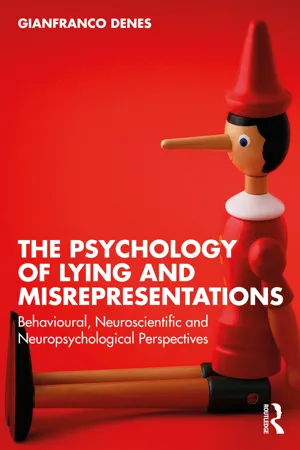
The Psychology of Lying and Misrepresentations
Behavioural, Neuroscientific and Neuropsychological Perspectives
- 144 pages
- English
- ePUB (mobile friendly)
- Available on iOS & Android
The Psychology of Lying and Misrepresentations
Behavioural, Neuroscientific and Neuropsychological Perspectives
About this book
This accessible yet scholarly book focuses on the study of the psychology of lying and misrepresentation, exploring the analysis of the cognitive and neural mechanisms that allow the construction of a false response, both consciously and as a consequence of a brain injury. Drawing on perspectives from experimental, neuropsychological and developmental psychology as well as philosophy, the book examines the mechanisms that allow us all to learn to lie and use lies for different ends and in everyday life.
The Psychology of Lying and Misrepresentations opens with an introductory chapter on lies and the processes underlying their production. It goes on to examine our innate desire to believe, and the clinical and technical methods used to determine whether someone is lying or telling the truth. The book takes a closer look at false memories and self-deception and the reasons behind their establishment and success in an individual's life. It then moves on from focusing on the individual to discuss the lies directed towards the collective and puts forth the questions around false news and its sustenance over time. The concluding chapters focus on memory disorders resulting from brain damage and false beliefs resulting from an expression of functional damage to specific neural systems.
This book will be of value to researchers in a range of disciplines interested in all aspects of lying, deception, and misrepresentation, as well as experts in forensic study.
Frequently asked questions
- Essential is ideal for learners and professionals who enjoy exploring a wide range of subjects. Access the Essential Library with 800,000+ trusted titles and best-sellers across business, personal growth, and the humanities. Includes unlimited reading time and Standard Read Aloud voice.
- Complete: Perfect for advanced learners and researchers needing full, unrestricted access. Unlock 1.4M+ books across hundreds of subjects, including academic and specialized titles. The Complete Plan also includes advanced features like Premium Read Aloud and Research Assistant.
Please note we cannot support devices running on iOS 13 and Android 7 or earlier. Learn more about using the app.
Information
Table of contents
- Cover
- Half Title
- Title
- Copyright
- Dedication
- Contents
- Foreword
- Introduction
- 1 Lies
- 2 Learning to Lie
- 3 Believing Is Easy
- 4 Lie Detectors
- 5 Pathological Lies and Self-Deception
- 6 Memory: Functional Organisation and Its Neurological Basis
- 7 Manipulating Public Memory: Fake News, Bullshit, and Factoids
- 8 Brain Damage and False Memories: Confabulations
- 9 The Neuropsychology of Delusion and Misidentification
- Index